I love to read. By God’s grace I am a pretty fast reader; I usually read a couple books each week. I find it helpful to summarize my thoughts on each book and I offer those thoughts in the hope that you will be encouraged to either read or pass over the given title.
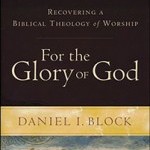 For the Glory of God: Recovering a Biblical Theology of Worship by Daniel Block. I love to see scholars branch out and publish works outside their ordinary discipline. The church needs well-rounded scholars who can speak knowledgeably and winsomely to a whole host of issues. For the Glory of God finds Old Testament scholar Daniel Block employing his formidable exegetical skill on the topic of worship. I’ve always found Block to be a bit iconoclastic at times and that tendency is on display from the earliest pages of this book. He believes, and I’m inclined to agree, that too many of the standards works in the field of worship drive an unfortunate wedge between the two testaments’ instruction on worship. Block reveals greater unity across the canon on all kinds of worship matters. He defines true worship as “reverential human acts of submission and homage before the divine Sovereign in response to his gracious revelation of himself and in accord with his will.” With this definition in place he arranges his material topically, choosing to show how a given issue (such as the object of worship, the ordinances, music, and the proclamation of Scripture) develops across redemptive history. Every chapter is consumed with rigorous exegesis of the relevant texts, but practical application is never lacking as Block consistently offers logical and wise implications for worship in our day. For the Glory of God is one of my favorite reads of the year.
For the Glory of God: Recovering a Biblical Theology of Worship by Daniel Block. I love to see scholars branch out and publish works outside their ordinary discipline. The church needs well-rounded scholars who can speak knowledgeably and winsomely to a whole host of issues. For the Glory of God finds Old Testament scholar Daniel Block employing his formidable exegetical skill on the topic of worship. I’ve always found Block to be a bit iconoclastic at times and that tendency is on display from the earliest pages of this book. He believes, and I’m inclined to agree, that too many of the standards works in the field of worship drive an unfortunate wedge between the two testaments’ instruction on worship. Block reveals greater unity across the canon on all kinds of worship matters. He defines true worship as “reverential human acts of submission and homage before the divine Sovereign in response to his gracious revelation of himself and in accord with his will.” With this definition in place he arranges his material topically, choosing to show how a given issue (such as the object of worship, the ordinances, music, and the proclamation of Scripture) develops across redemptive history. Every chapter is consumed with rigorous exegesis of the relevant texts, but practical application is never lacking as Block consistently offers logical and wise implications for worship in our day. For the Glory of God is one of my favorite reads of the year.
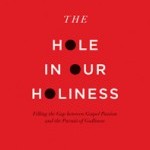 The Hole in Our Holiness: Filling the Gap Between Gospel Passion and the Pursuit of Godliness by Kevin DeYoung. Of all the young and popular authors today, DeYoung is probably my favorite. His works are always full of wit, wisdom, and “ruthless Bible-centeredness” (to adjust Piper’s endorsement of this book). I think this is the fourth time I’ve read The Hole in Our Holiness in two years and I’m always challenged afresh in the pursuit of godliness. I love his attention to the breadth and diversity of motivations for holiness, his pastoral sensibility of treasuring a tender conscience, and his exhortation to extraordinary holiness through ordinary means. If you’ve yet to read this book, grab a copy, invite a friend to read it with you, and stir up one another to a joy-filled, purposeful striving after the holiness without which no one will see the Lord.
The Hole in Our Holiness: Filling the Gap Between Gospel Passion and the Pursuit of Godliness by Kevin DeYoung. Of all the young and popular authors today, DeYoung is probably my favorite. His works are always full of wit, wisdom, and “ruthless Bible-centeredness” (to adjust Piper’s endorsement of this book). I think this is the fourth time I’ve read The Hole in Our Holiness in two years and I’m always challenged afresh in the pursuit of godliness. I love his attention to the breadth and diversity of motivations for holiness, his pastoral sensibility of treasuring a tender conscience, and his exhortation to extraordinary holiness through ordinary means. If you’ve yet to read this book, grab a copy, invite a friend to read it with you, and stir up one another to a joy-filled, purposeful striving after the holiness without which no one will see the Lord.
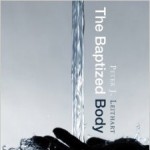 The Baptized Body by Peter Leithart. Every month I meet with a group of pastors in our county for lunch and some “affectionately contentious fellowship.” One brother whom I particularly enjoy hanging out with is a voluminous reader and never ceases to suggest a title I “must read” on a given topic. A few months ago we were talking about baptism and he said, “You gotta read Peter Leithart and The Baptized Body.” Knowing my skepticism toward all things Federal Vision, he must have assumed I wasn’t going to buy a copy so he sent one in the mail. I thus felt duty-bound to read Leithart’s book-length answer to the question of, “Does baptism do anything to the baptized?” Leithart says, “Yes!” and I agree. We just disagree on what it actually does. Leithart goes father than I’m willing to go by saying the baptized are made partakers of all the benefits of Christ, even if they don’t truly believe in the Lord Jesus. Anyone familiar with Leithart and the Federal Vision hullabaloo of the last decade or so won’t find anything surprising here.
The Baptized Body by Peter Leithart. Every month I meet with a group of pastors in our county for lunch and some “affectionately contentious fellowship.” One brother whom I particularly enjoy hanging out with is a voluminous reader and never ceases to suggest a title I “must read” on a given topic. A few months ago we were talking about baptism and he said, “You gotta read Peter Leithart and The Baptized Body.” Knowing my skepticism toward all things Federal Vision, he must have assumed I wasn’t going to buy a copy so he sent one in the mail. I thus felt duty-bound to read Leithart’s book-length answer to the question of, “Does baptism do anything to the baptized?” Leithart says, “Yes!” and I agree. We just disagree on what it actually does. Leithart goes father than I’m willing to go by saying the baptized are made partakers of all the benefits of Christ, even if they don’t truly believe in the Lord Jesus. Anyone familiar with Leithart and the Federal Vision hullabaloo of the last decade or so won’t find anything surprising here.
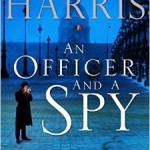 An Officer and a Spy by Robert Harris. Have you heard of the Dreyfus Affair? If not, you are missing out on one of the more fascinating legal and political scandals that rocked the western world at the turn of the 20th century. In An Officer and a Spy the brilliant Robert Harris gives us a historically informed narrative of that most salacious of events. The book cover rightly captures the immense tension by saying, “A whistle-blower. A witch hunt. A cover-up. Secret tribunals, out-of-control intelligence agencies, and government corruption. Welcome to 1890s Paris.” Alfred Dreyfus has been convicted of treason, sent off to prison on Devil’s Island, and publicly degraded from military rank. Harris focuses his retelling on Georges Picquart, the venerable investigator who lost his reputation and nearly his life in pursuit of the truth about Dreyfus. If you don’t know the history behind this story resist the temptation to look it up on Wikipedia, buy a copy of Harris’ novel, and find yourself enthralled.
An Officer and a Spy by Robert Harris. Have you heard of the Dreyfus Affair? If not, you are missing out on one of the more fascinating legal and political scandals that rocked the western world at the turn of the 20th century. In An Officer and a Spy the brilliant Robert Harris gives us a historically informed narrative of that most salacious of events. The book cover rightly captures the immense tension by saying, “A whistle-blower. A witch hunt. A cover-up. Secret tribunals, out-of-control intelligence agencies, and government corruption. Welcome to 1890s Paris.” Alfred Dreyfus has been convicted of treason, sent off to prison on Devil’s Island, and publicly degraded from military rank. Harris focuses his retelling on Georges Picquart, the venerable investigator who lost his reputation and nearly his life in pursuit of the truth about Dreyfus. If you don’t know the history behind this story resist the temptation to look it up on Wikipedia, buy a copy of Harris’ novel, and find yourself enthralled.
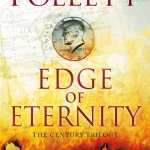 Edge of Eternity by Ken Follett. Edge of Eternity is the final entry in Follett’s smashingly successful “The Century Trilogy” and it’s also his most ambitious. At the risk of over-generalizing Fall of Giants dealt with World War I era and Winter of the World handled the World War II era. So what’s left for this final volume? The Cold War. While Edge of Eternity covers the swath of 1961-2008, more than 800 of the book’s nearly 1,100 pages are set between 1961 and ’68. Khrushchev, the Kennedys, Martin Luther King Jr., civil rights, and the Berlin Wall dominate the narrative with occasional forays into rock ‘n roll and the movement of free love. It’s all handled in typical Follett fashion: a unified tale told through the dual lenses of love and heartbreak. The sheer amount of time Follett covers ends up making the book more about breadth than depth, but Edge of Eternity is nevertheless a satisfying conclusion to a brilliant trilogy.
Edge of Eternity by Ken Follett. Edge of Eternity is the final entry in Follett’s smashingly successful “The Century Trilogy” and it’s also his most ambitious. At the risk of over-generalizing Fall of Giants dealt with World War I era and Winter of the World handled the World War II era. So what’s left for this final volume? The Cold War. While Edge of Eternity covers the swath of 1961-2008, more than 800 of the book’s nearly 1,100 pages are set between 1961 and ’68. Khrushchev, the Kennedys, Martin Luther King Jr., civil rights, and the Berlin Wall dominate the narrative with occasional forays into rock ‘n roll and the movement of free love. It’s all handled in typical Follett fashion: a unified tale told through the dual lenses of love and heartbreak. The sheer amount of time Follett covers ends up making the book more about breadth than depth, but Edge of Eternity is nevertheless a satisfying conclusion to a brilliant trilogy.
Click here to find other entries in the Recent Reads series.
